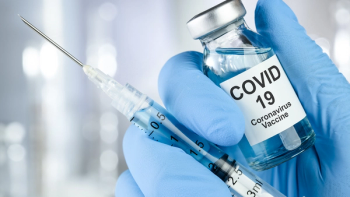
Patients with myeloma who reported that their disease was incurable had lower quality of life. However, many patients may also have misconceptions about the curability of their disease.


Patients with myeloma who reported that their disease was incurable had lower quality of life. However, many patients may also have misconceptions about the curability of their disease.

Abatacept is now available for use in combination with certain immunosuppressants to prevent moderate to severe acute-graft-versus-host disease for select patients who have received unrelated donor hematopoietic stem cell transplant.

A presentation at the 2021 ASH Annual Meeting revealed a significant association between elevated white blood counts and thrombotic events among patients with polycythemia vera and controlled hematocrit levels.

Ibrutinib, both in the frontline setting and in the form of continuous treatment, was associated with improved quality of life over chemoimmunotherapy for patients with chronic lymphocytic leukemia.

If patients with cancer experience depression or anxiety, it can result in low clinical trial enrollment.

Tisagenlecleucel evoked similar efficacy and a preferrable safety profile in children and adults with B-ALL being treated in a real-world analysis, compared with the clinical trial ELIANA.

In comparison to physicians’ choice of treatment, ciltacabtagene autoleucel demonstrated significant advantages in progression-free and overall survival, time to next treatment, and overall response rate.

Combining ibrutinib with rituximab resulted in improved 2-year progression-free survival among elderly patients with previously untreated diffuse large B-cell lymphoma.

The FDA has approved the combination of rituximab plus chemotherapy to treat children aged between 6 months and 18 years who have advanced-stage, CD20-positive diffuse large B-cell lymphoma (DLBCL), Burkitt lymphoma (BL), Burkitt-like lymphoma (BLL), or mature B-cell acute leukemia (B-AL).

Patients with relapsed/refractory chronic lymphocytic leukemia experienced positive gene set enrichment after receiving ibrutinib in addition to lisocabtagene maraleucel.

Physicians urge patients with lymphoid malignancies to continue precautionary COVID-19 measures regardless of vaccination status.

Stephanie Jackson, DNP, MSN, RN, AOCNS, BMTCN, Oncology Nursing News co-editor in chief, discusses the importance of NCCN guidelines in prescribing medications for patients with chronic leukemia. .

Ropeginterferon alfa-2b-njft is now an FDA-approved drug for the treatment of polycythemia vera.

Stephanie Jackson, DNP, MSN, RN, AOCNS, BMTCN, Oncology Nursing News co-editor in chief, discusses omacetaxine as a novel regimen in CML treatment.

Findings from biomarker tests for patients with chronic lymphocytic leukemia can help appropriately tailor therapy plans as well as identify patients eligible for clinical trials.

Newer modalities seek to use MRD to provide more definitive prognoses.

The new Cilta-Cel PDUFA decision date is February 28, 2022.

CAR T-cell therapies represent a potent treatment option for patients with heavily pretreated relapsed/refractory hematologic malignancies, however, the infection risk associated with treatment may hinder the efficacy of COVID-19 vaccines in this population.

Ruxolitinib was not associated with an increased risk of secondary malignancies in patients with polycythemia vera.

Parsaclisib has been granted a priority review for 3 indications that include relapsed or refractory follicular, marginal zone, and mantle cell lymphoma.

The FDA have granted an accelerated approval to acimibinib, which treats CML by binding to the ABL myristoyl pocket.

Stephanie Jackson, DNP, MSN, RN, AOCNS, BMTCN, Oncology Nursing News co-editor in chief, comments on how health care providers can effectively care for patients with COVID-19 and hematologic malignancies.

Autologous hematopoietic stem-cell transplantation, the standard frontline treatment in treating patients with mantel cell lymphoma, demonstrated superior long-term efficacy compared with interferon alfa in a recent trial.

Stephanie Jackson, DNP, MSN, RN, AOCNS, BMTCN, Oncology Nursing News co-editor in chief, comments on the dedication she has observed from caregivers taking care of loved ones with leukemia during the COVID-19 era.

Brexucabtagene autoleucel is now an FDA approved treatment options for adult patients with relapsed/refractory B-cell precursor acute lymphoblastic leukemia.